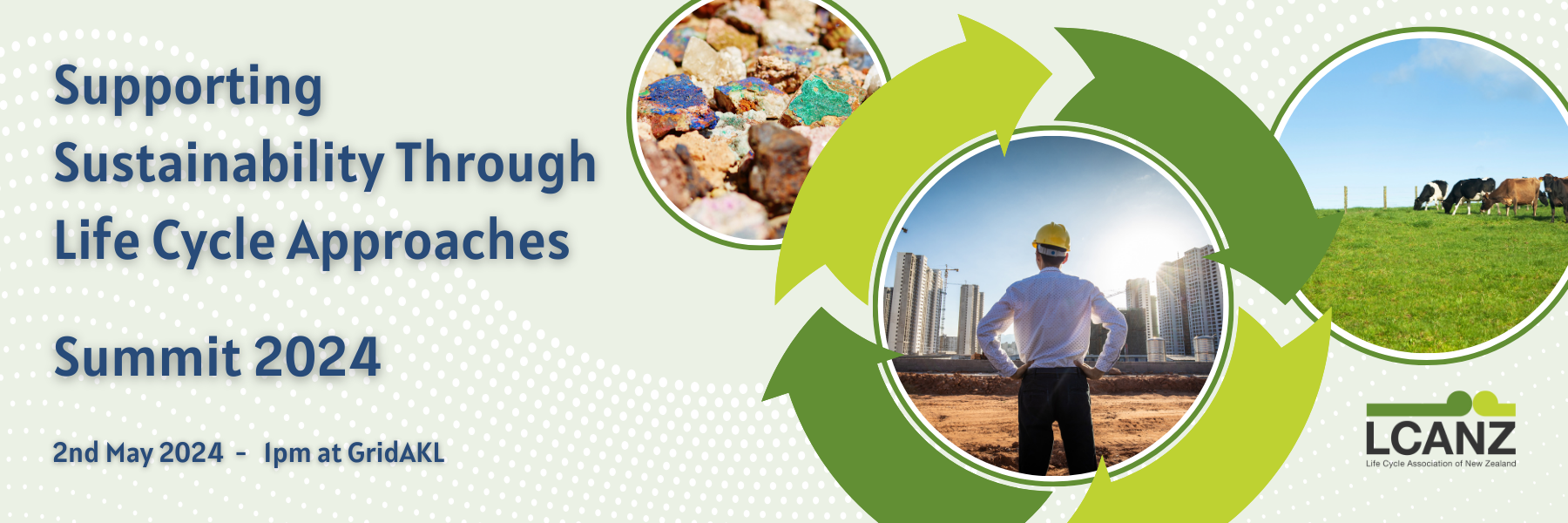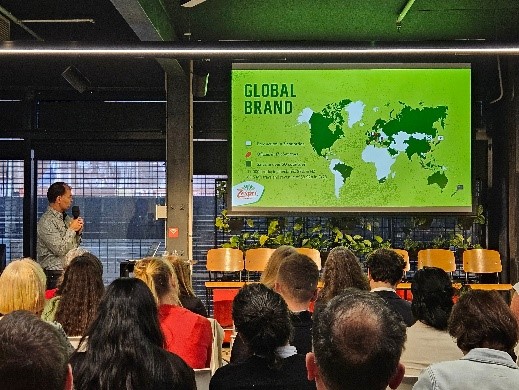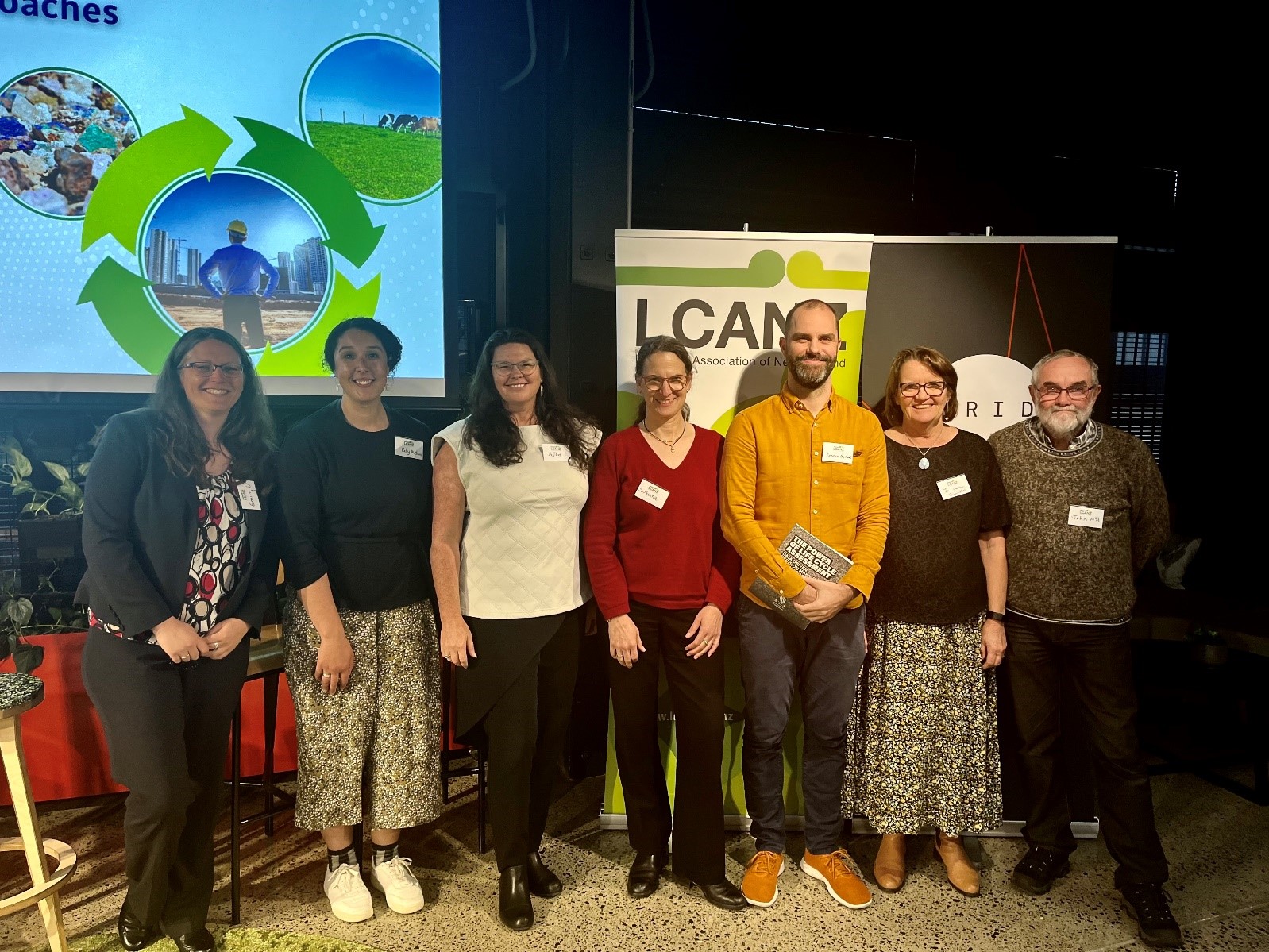Supporting Sustainability through Life Cycle Approaches – 2024 Summit Review
On the 1st of May and graced by a sunny (then rainy, then sunny again!) day in Auckland, our members gathered once again at the GridAKL for the annual Life Cycle Association New Zealand Summit. After some good catch-ups and laughs, we started the afternoon off with our keynote speakers.
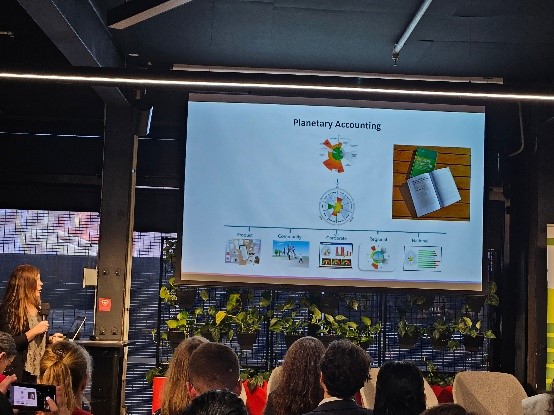 Kate Meyer from Planetary Accounting Network (PAN) was first on the scene to discuss Planetary Facts and the current challenges we face with decision-making when we only have one-side of the planetary ‘ledger’, i.e., environmental impacts without considering environmental capacity.
Kate Meyer from Planetary Accounting Network (PAN) was first on the scene to discuss Planetary Facts and the current challenges we face with decision-making when we only have one-side of the planetary ‘ledger’, i.e., environmental impacts without considering environmental capacity.
Kate is the creator of Planetary Accounting: a peer-reviewed framework that contextualises environmental accounting. She is the Founder/CEO of the Planetary Accounting Network and Planetary Insights, and a Director on the Destination Southern Lakes Board. Kate has led many award-winning projects and taken on leadership roles such as Sustainability Director at Beca. Her work has been acknowledged in platforms such as TedX, the Deloitte Top200 Sustainability Leadership Awards and Auckland University’s 40Under40 awards.
Kate highlighted that regular environmental impact assessments don’t typically acknowledge the positive, or lower impacts of conscious design and procurement choices. Enter: the Planetary Accounting Framework. This framework ensures we capture these impacts versus capacities across the nine planetary boundaries to enable decision-makers to have robust yet manageable and science-based data to inform their decisions. This framework can also be utilised further afield to the realm of the consumer to encourage public engagement, education and awareness.
Kate also shared a glimpse into an exciting new initiative: Planetary Facts labels! Similar to nutrition labels, the Planetary Facts labels have been designed by The Planetary Accounting Network to simply (and visually) break down a product’s whole-of-life environmental impacts across the nine planetary boundaries to improve consumer awareness, product transparency and accessibility to environmental information. Whilst this is still in its development phase, Raglan Coconut Yoghurt has been the first to adopt this initiative on a trial basis, and an audible murmor ran through the room when we got to observe the environmental differences between mango and blueberry coconut yoghurt. This is an exciting new space that will help to minimise greenwashing and reinstate confidence in consumers when purchasing ‘sustainable’ products.
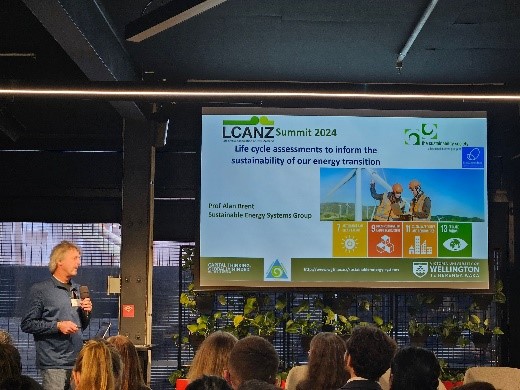 Next on the mic was Alan Brent from Te Herenga Waka Victoria University of Wellington to talk about using Lifecycle Assessments to inform the Sustainability of our Energy Transitions.
Next on the mic was Alan Brent from Te Herenga Waka Victoria University of Wellington to talk about using Lifecycle Assessments to inform the Sustainability of our Energy Transitions.
Alan is the inaugural chair of Sustainable Energy Systems in the Wellington Faculty of Engineering of Te Herenga Waka Victoria University of Wellington. He is a Fellow of Engineering New Zealand, and an executive committee member of The Sustainability Society. He has been active in the Life Cycle Assessment domain for over two decades.
Alan highlighted the more acute trends (or simply, the ‘6D trends’) that the sector is currently facing under the energy trilemma framework, namely: decarbonisation, decentralisation, digitisation, democracy, disruption and diversity.
As we shift our consumption away from non-renewable energy, we see a concurrent increase in our dependence on (and demand of) renewable energy technologies, and the finite materials required to produce them – a tricky tightrope to walk, to say the least.
Whilst this issue is not new, it critically underpins the future of ensuring secure, equitable and sustainable energy supply. How can we look to tackle this Gordian Knot? Unravelling this issue requires a whole system approach across all business operations, and integrated lifecycle assessments can act as a key ‘tool’ to create insights to inform these system(s) at play. Alan explored the system flows between the project, asset and product lifecycles to show that these in fact do not exist in isolation but instead are inherently interconnected and must be managed as such to enable apt sustainable management. This of course then flows on to the wider supply chain and economy as a whole, allowing organisations to not only unpack the environmental impact of their operations, but to look outwards to how their operations affects the remaining pillars of sustainability: culture, society and the economy.
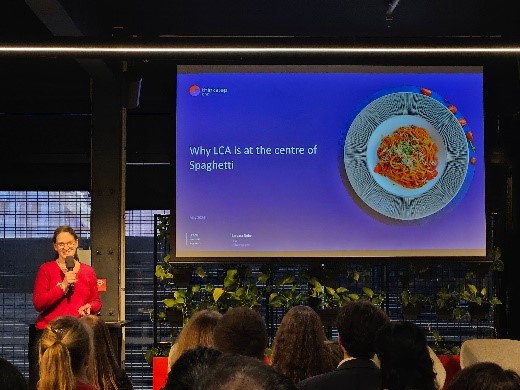 LCANZ president and founder Barbara Nebel from thinkstep-anz was our third and final keynote speaker discussing Why LCA is at the centre of the ‘Spaghetti’.
LCANZ president and founder Barbara Nebel from thinkstep-anz was our third and final keynote speaker discussing Why LCA is at the centre of the ‘Spaghetti’.
Barbara’s passion is to enable organisations to succeed sustainably. She often describes her job as a translator, translating sustainability into traditional business language. Barbara has worked with organisations in New Zealand, Australia, Asia and Europe, effectively linking sustainability with business value. She is a member of the International EPD system and on the Steering Group for the Climate Leaders Coalition. Barbara has chaired the New Zealand working group for the development of ISO standards for Carbon Footprinting, is a Certified LCA Practitioner, and an associate editor for the International Journal of LCA.
Barbara honed in on the idea that lifecycle assessments lie at the centre of the ‘spaghetti’ bowl that encompasses the vast world of sustainability, including minimising greenwashing, increased transparency and visibility of supply chains, environmental reporting – the list goes on really! As a familiar output of LCAs, Environmental Product Declarations (EPDs) are continually becoming more common in business-as-usual practice, however EPDs as they currently stand miss a critical component of sustainability: sociocultural impacts. Noting that these issues are far harder to quantify, Barbara introduced the new concept of an ‘SPD’ or ‘Social Product Declarations’ to provide a more standardised, qualitative measure of the likelihood of social risk and impacts based off verified social data.
Barbara flagged that this concept has already been successfully piloted and published for the Hitachi Rail HTR 412 Blues trains, which analysed the social risks to workers, communities and users across the entire lifecycles. This was an exciting glimpse into the future of lifecycle assessments and how the methodology can be applied to analyse impacts that can otherwise be hard to qualitatively assess.
After these jam-packed keynotes, the speakers opened the floor up for the panel discussion.
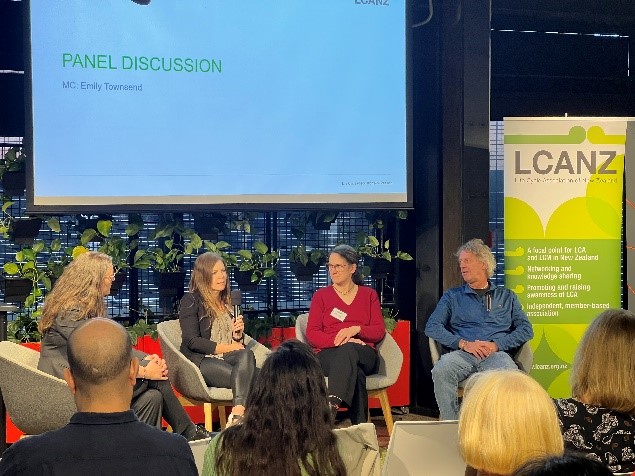
Finally in the first session, we had an update from our Best Practice Working Group (BPWG).
Over the past year, BPWG has been working hard to get broader representation across LCANZ membership. They recently developed a work plan that includes completion of competitive claims guidance, register development of NZ databases and submission responses as they arise.
Co-chair Kimberly Roberston is stepping down after over a decade involvement in LCANZ and BPWG. On behalf of LCANZ, Kelly thanked Kimberly for her contributions.
Jeff Vickers also shared details on important changes to EPD rules, further information available here: https://epd-australasia.com/2024/05/rule-changes-for-epds-for-construction-products/
The second half of the summit focused on case study examples, from a variety of industries.
Dr Jayson Benge is the Environment Sustainability Specialist in Zespri’s global sustainability team. He has 20 years of experience working on sustainability projects, largely in the kiwifruit sector. Jayson has been involved in much of the previous carbon measurement across Zespri’s supply chain and has worked with various LCA experts along the way such as thinkstep, Catalyst and Agrilink.
Jayson ran us through how Zespri is integrating sustainability in practice, including its commitment to being carbon positive by 2035, the completion of Zespri’s Adaptation Plan (to be published later this year) and the use of lifecycle approaches to embed circularity and transparency into their management and operations.
We also got a look into Zespri’s ‘Orchard Carbon Footprint Calculator’ where Zespri growers can measure their individual carbon footprints to gain insight into their emissions and agency over their environmental impacts.
Eloise Blewden and Carlos Kershaw from Aurecon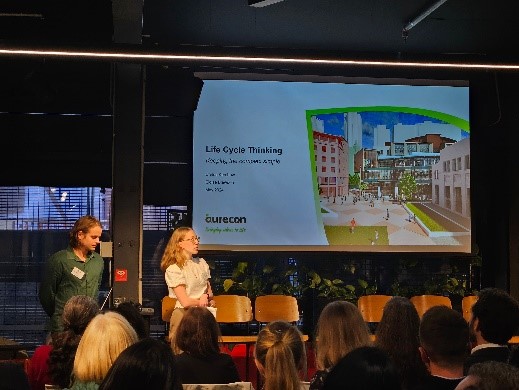
Eloise Blewden, a Sustainability Engineer in the Buildings team at Aurecon, is a Master of Architecture graduate, former New Zealand Green Building Council’s Future Thinker of the Year Winner and a Green Star Accredited Professional (GSAP). She has experience in life cycle assessments for commercial and public buildings, with a specific focus on embodied carbon.
Carlos Kershaw is a Senior Consultant of Sustainability and Climate Change at Aurecon and has his Bachelors of Mechanical Engineering with Honours. He has applied the principles of life cycle thinking to inform decision-making, as well as carbon management for major infrastructure projects, environmental and broader outcomes digital tools development, and has authored EPDs.
Eloise and Carlos discussed three of their recent infrastructure projects in which they’ve applied lifecycle thinking early into design to help asset owners and designers make informed decisions with respect to the project’s likely carbon impacts, cost and project requirements.
The use of parametric modelling early in design allows for quick component and material modifications changes to gauge a high-level understanding of each potential design’s relative carbon impacts. Eloise and Carlos also touched on the challenge of information sharing, questioning how we can best share lifecycle information beyond the bounds of a project to contribute to (and improve on) industry knowledge?
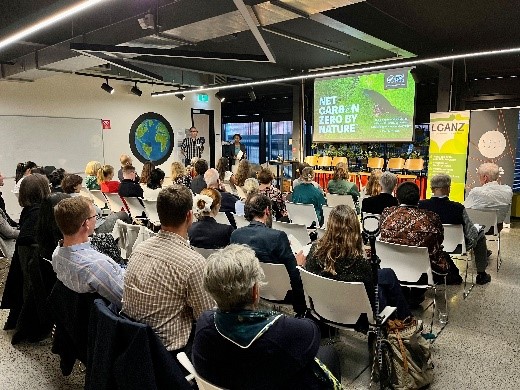 Abbas Tamadon and Diana Hawkins from Toitū Envirocare
Abbas Tamadon and Diana Hawkins from Toitū Envirocare
Abbas Tamadon, Senior Advisor – LCA & Tools, has over five years of extensive LCA experience across research academia and industry. He leads LCA projects in construction, manufacturing, food, and agriculture sectors, focusing on product carbon footprint, EPD, and Circularity. He also develops LCA methodology guidelines and product footprint specifications.
Diana Hawkins, Senior Advisor – Primary Sector and Waste, joined Toitū in 2022, working with product, event, and fitout programme clients to measure and reduce their carbon emissions and prepare for verification under Toitū’s carbon programmes. She has over fifteen years’ experience in project management, scientific research, science communication, and viticulture. She provides guidance, advice, and support agriculture and horticulture clients.
Abbas and Diana discussed how they’re working with the agricultural industry to shift towards more sustainable production through LCA. Diana provided an overview of Silver Fern Farms approach to becoming a low-carbon, nature positive organisation and the life cycle of their red meats. Understanding the breadth and source of an organisation’s impacts is the first step in reducing emissions and the financial cost that this could incur the future.
Silver Fern Farms’ carbon-communicating packaging also took to the stage, perhaps the first in its industry to display their product’s carbon impacts so clearly and transparently right at the point of purchasing: conveying not only the overall impact, but breaking it down through farm, packaging, storing and even cooking. A nod to the fact that consumer transparency does not need to be to an organisation’s detriment but can empower both suppliers and consumers to move towards more sustainable production and consumption.
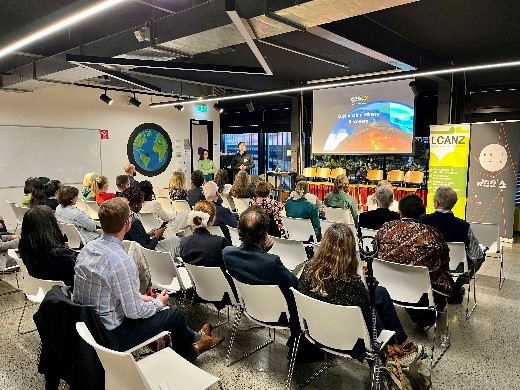 Che Kranenburg from Geo40, Noa Meron from thinkstep-anz
Che Kranenburg from Geo40, Noa Meron from thinkstep-anz
Che Kranenburg, Product & Development Manager at Geo40, is an environmental scientist studying and working across New Zealand and Australia, with over fifteen years of experience across consulting, sales, civil development and oil and gas roles. Che leads the application and sales of Geo40’s products into environmental, civil development and heavy industry markets.
Noa Meron, Team Lead LCA at thinkstep-anz, has over twelve years of experience in environmental consulting and LCA, including comparative and consequential LCAs. Her experience ranges from product and packaging design to technology and building materials. Noa is skilled at creating calculators and programming scripts to help make sense of sustainability data.
Che and Noa closed our case studies section with a review of the recently released EPD created for Geo40; a homegrown mineral recovery company that has developed a world-first technology for colloidal silica recovery from geothermal sources. This process is both less environmentally invasive and less carbon intensive than traditional blast furnace manufacturing. Noa spoke to the process of developing an EPD for the colloidal silica to measure upstream, core and downstream emissions sources and to identify key opportunities for Geo40 to continue to reduce their carbon footprint. Whilst (as Che pointed out) “price remains king”, having an environmental product declaration act as a point of difference in an industry where momentum for environmental accountability remains low.
These case studies were followed by a second panel discussion and closing remarks from Barbara. All in all, the 2024 Summit was filled exciting prospects across a variety of industries, energised conversations, challenging questions, and a few good chuckles along the way. Until next year, stay sustainable!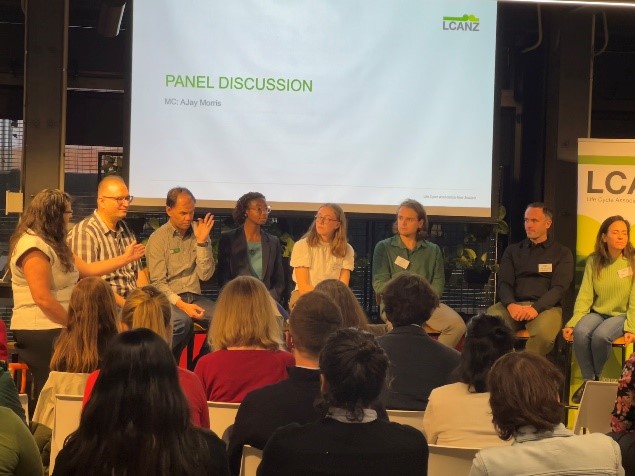
LCANZ summit events team
Emily Townsend, Kelly McClean, AJay Morris, Barbara Nebel, Ferran de Miguel Mercader, Joanne Duncan, John McArthur
Summary by Sophie Ciurlionis

